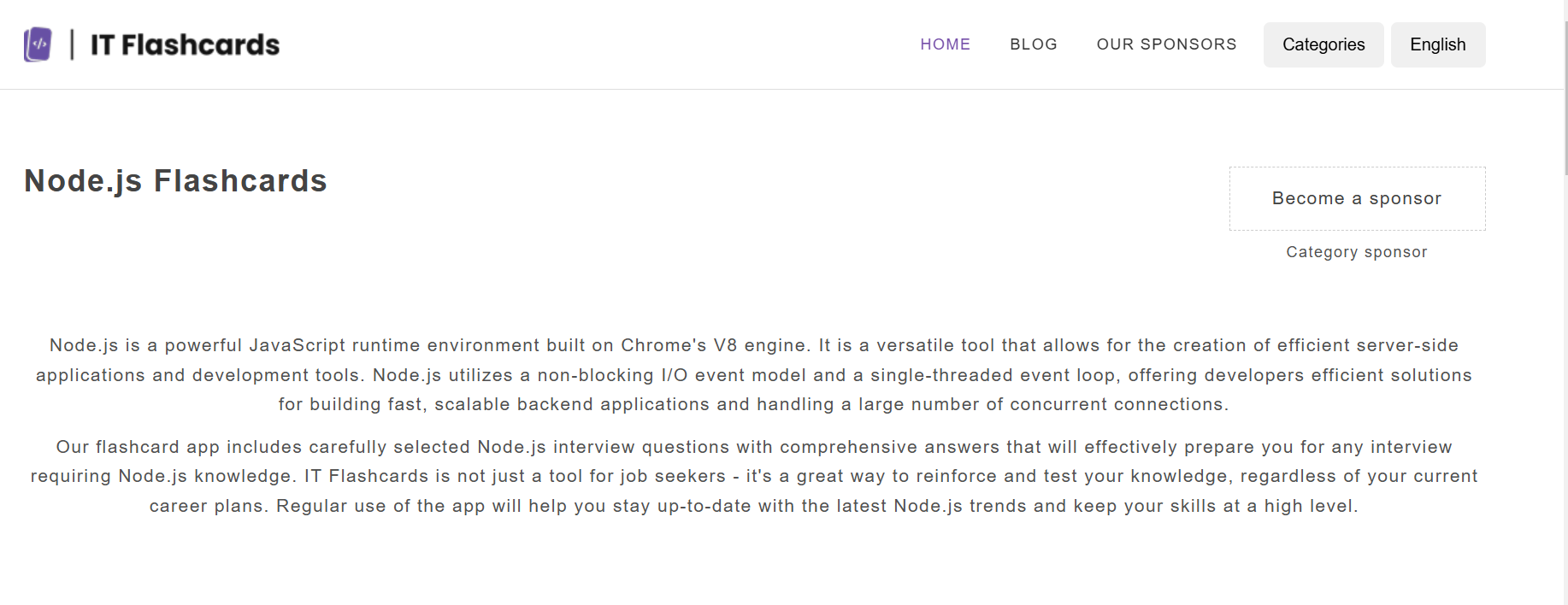Node.js Interview Questions: Essential Guide for Developers

Strong 8k brings an ultra-HD IPTV experience to your living room and your pocket.
Preparing for a Node.js job interview? Explore these essential Node.js interview questions covering core concepts, best practices, and advanced topics.
Node.js Interview Questions: Essential Guide for Developers
Node.js has gained massive popularity in backend development, making it a crucial skill for developers. If you're preparing for a job interview, understanding key Node.js interview questions can give you an edge. This guide covers basic, intermediate, and advanced questions to help you succeed.
Basic Node.js Interview Questions
1. What is Node.js?
Node.js is an open-source, cross-platform JavaScript runtime environment that allows developers to run JavaScript code outside a browser. It is built on Chrome’s V8 engine and is designed for building scalable, high-performance applications.
2. What are the key features of Node.js?
• Asynchronous & Event-Driven: Node.js handles multiple requests without blocking execution.
• Single-Threaded: Uses a single-threaded event loop model for handling concurrent requests.
• Fast Execution: Powered by Google’s V8 engine, it executes JavaScript quickly.
• Scalability: Handles multiple client requests efficiently.
• Cross-Platform Compatibility: Works on Windows, macOS, and Linux.
3. What is the difference between Node.js and JavaScript?
JavaScript is a scripting language used for client-side development, while Node.js enables server-side execution of JavaScript. Node.js provides modules like HTTP, FS, and Path that are not available in the browser.
4. What is the event loop in Node.js?
The event loop is a core feature of Node.js that handles asynchronous operations. It continuously listens for events and executes callback functions, allowing non-blocking execution of tasks.
Intermediate Node.js Interview Questions
5. What are Streams in Node.js?
Streams are objects that enable reading or writing data in chunks. They improve performance by handling large files efficiently. Node.js has four types of streams:
• Readable: Used for reading operations (e.g., fs.createReadStream()).
• Writable: Used for writing operations (e.g., fs.createWriteStream()).
• Duplex: Used for both reading and writing (e.g., socket communication).
• Transform: Used for modifying data during reading and writing.
6. What is Middleware in Node.js?
Middleware functions in Node.js process HTTP requests and responses. They are commonly used in frameworks like Express.js for tasks such as authentication, logging, and error handling.
Example:
app.use((req, res, next) => {
console.log('Middleware executed');
next();
});
7. What is the difference between process.nextTick() and setImmediate()?
• process.nextTick() executes the callback at the end of the current operation, before moving to the event loop.
• setImmediate() executes the callback in the next iteration of the event loop.
8. What is the purpose of the package.json file in Node.js?
The package.json file contains metadata about the project, including dependencies, scripts, and configurations. It helps manage project dependencies efficiently.
Advanced Node.js Interview Questions
9. What is clustering in Node.js?
Clustering enables the creation of multiple Node.js processes, leveraging multi-core processors for better performance.
Example:
const cluster = require('cluster');
const http = require('http');
const os = require('os');
if (cluster.isMaster) {
for (let i = 0; i
cluster.fork();
}
} else {
http.createServer((req, res) => {
res.writeHead(200);
res.end('Hello World');
}).listen(3000);
}
10. How does Node.js handle memory management?
Node.js uses V8’s garbage collector, which follows the generational garbage collection model. It optimizes memory usage by collecting and freeing unused memory periodically.
11. What are Worker Threads in Node.js?
Worker Threads allow Node.js to execute JavaScript code in parallel, improving performance for CPU-intensive tasks.
Example:
const { Worker } = require('worker_threads');
const worker = new Worker('./worker.js');
worker.on('message', (msg) => console.log(msg));
12. What is the difference between require() and import()?
• require() is used in CommonJS modules and is synchronous.
• import is used in ES6 modules and supports asynchronous loading.
Conclusion
Mastering these Node.js interview questions will enhance your understanding of core concepts, helping you excel in technical interviews. Whether you're a beginner or an experienced developer, continuous learning and practice are key to acing your next Node.js interview.
Note: IndiBlogHub features both user-submitted and editorial content. We do not verify third-party contributions. Read our Disclaimer and Privacy Policyfor details.



